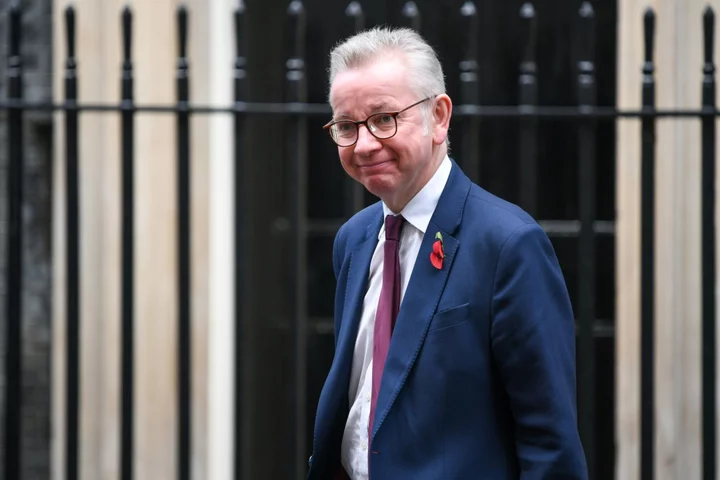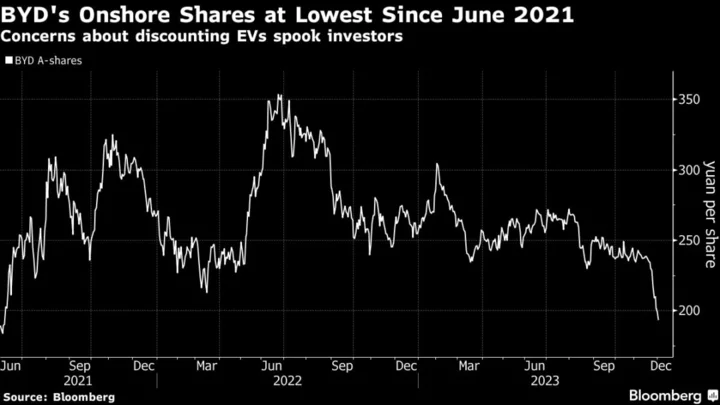The UK government vowed to stick to its ban on the sale of new petrol and diesel cars from 2030 in an attempt to reassure businesses and investors in the electric vehicle industry after Prime Minister Rishi Sunak had appeared to waver on the policy in recent days.
Sunak on Monday declined to commit to the ban when asked by broadcasters about it, and another minister, Andrew Mitchell, had also cast doubt on the deadline. But Housing Secretary Michael Gove on Tuesday replied “yes” when asked by Times Radio if the timing of the ban was immovable. Asked later by Sky News if that was an “absolute guarantee,” Gove again replied: “Yes.”
However Gove suggested the government may review the pace of its roll-out of low-carbon domestic heating systems, such as heat pumps, in lieu of gas boilers. Asked about a policy to require all new homes to use such systems from 2025, Gove told Times Radio that is one area “I do think that we need to review again,” while stressing that new housing “should meet net zero standards.”
Sunak has faced increased pressure from members of his own Conservative Party to water down his pledges geared toward eliminating the UK’s net carbon emissions by 2050 in the wake of a special election last week in which the Tories unexpectedly eked a narrow victory over Labour after campaign against local restrictions on vehicle emissions. With the Tories trailing the main opposition party by a margin of around 20 points in recent polls, some MPs have portrayed environmental policies as a drag on Conservative fortunes in the midst of a cost-of-living crisis.
The 2030 ban on petrol cars had been in the sights of some Tories who oppose it on the right of the party, though Gove’s remarks appear to have shot down their efforts to delay the deadline. That may allay any concerns held by electric vehicle businesses which the government is trying to lure to Britain. The 2030 ban — as well as a generous government subsidy — formed the backdrop of Tata Group’s decision to plow £4 billion into a new electric car battery plant in the UK last week. The government is trying to encourage more companies to build so-called “gigafactories” in the UK.
The government’s 2025 mandate on heating systems for new homes aims to help grow the market in heat pumps to some 600,000 installations a year by 2028. The government also aims for new heating systems installed in all homes to be low carbon from 2035 — or in the case of gas boilers, capable of at least being converted to use hydrogen.
“We do need to be careful about imposing because again, we are living through a real cost of living challenge,” Gove told Times Radio. “What we don’t want to do is to force individuals to pay excessive sums at this stage. We need to take a proportionate approach.”
Gove later said that another area the government is looking to relax is the pace at which private landlords need to make energy efficiency improvements to the housing stock they rent out. He told the BBC the government would “ease off” on new environmental requirements for the private rental sector, without going into detail.
Nevertheless, it is unclear how the government would be able to weaken its position on transitioning from gas boilers to alternative heating systems, while maintaining its legal commitments to end the UK contribution to global warning by 2050.
Ministers lost a landmark case last year when the High Court found an earlier version of its Net Zero Strategy was unlawful because it did not show how it would meet the emissions target in sufficient detail. To meet the 2050 target, the government is required by domestic law to set five-year carbon budgets 12 years in advance to chart how it intends to reach net zero. They set the total emissions permissible in successive five-year windows.
--With assistance from Ellen Milligan.









